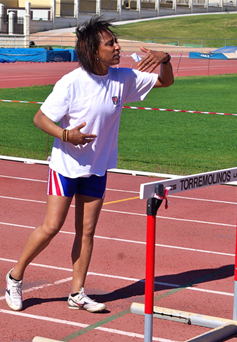1.1 Lois’s experience
As you have seen, Lois has struggled to come to terms with being injured. In the activity that follows you will explore how this might impact on her rehabilitation.
Activity 1 Lois’s reaction to injury
Read about how Lois is coping with her injury in the box below. Then reflect on how her responses to her injury are impacting on her recovery and rehabilitation.
 | Following her injury Lois has been feeling quite down. She is struggling with not being able to train and compete and is missing being part of her training group. Her coach Wilma has noticed that she has been withdrawn and quiet and not her usual bubbly self. Lois has told Wilma that, as well as being frustrated about not being able to run, she feels socially isolated as most of her friends are athletes. Wilma has also learned that Lois has not been attending all of her rehabilitation sessions at the sports medicine clinic. In the last few weeks she has only been to fifty per cent of her scheduled sessions. The physiotherapist has noted that she doesn’t seem very motivated in these sessions and isn’t working as hard as she could. Additionally, Lois has not been engaging in her daily rehabilitation exercises at home. The physiotherapist has referred her for a session with the sport psychologist at the clinic to try and get her back on track. When Wilma asked Lois about the rehabilitation sessions, she seemed very depressed and her response was ‘what’s the point? – my career is probably over anyway’. This does not match with the physiotherapist’s diagnosis, who believes she can make a full recovery. |
Discussion
It appears that Lois’s low mood is negatively impacting on her adherence to her rehabilitation programme which in turn will slow her recovery from the injury. Because Lois is feeling down, she doesn’t have the motivation to work hard on her rehabilitation. As the cognitive appraisal models show, Lois’s cognitive appraisal of the injury is resulting in a negative emotional response and an inappropriate behavioural response (poor adherence). This in turn is having a negative impact on her recovery outcomes (slowed recovery).
But what about Travis? How is he coping?
